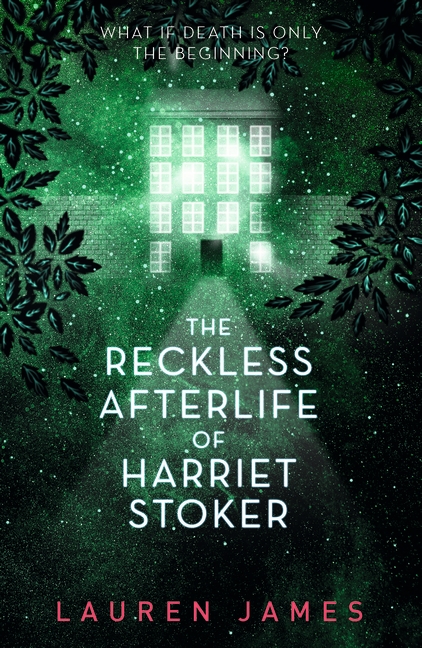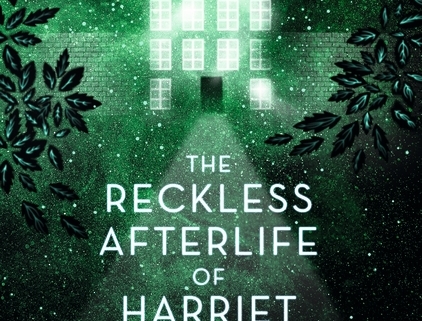The Reckless Afterlife of Harriet Stoker
Q&A with author Lauren James

What can readers expect from The Reckless Afterlife of Harriet Stoker, and how is it similar or different to your other novels?
It’s very different from my other books – it’s a horror, which I’ve written a bit of in The Loneliest Girl in the Universe, but not fully explored. It’s also my first book outside of the realm of science fiction, as this is a paranormal fantasy. I’m so glad I was allowed to explore other genres, as often authors are expected to continue writing similar types of books – so I feel really lucky to have stepped outside my comfort zone into something new. But it has a lot of the same elements of previous novels – humour, romance, plot twists, funny characters (or rather, characters who think they’re funny) and found families.
The ghosts in your world have their own energies, rules, powers: what made you want to show a different side to ghosts than we’ve seen in pop culture before, and how did you decide on the shape and structure of the afterlife in The Reckless Afterlife of Harriet Stoker?
My sci-fi is always heavily based on rules and real science, so when I started thinking about the world of ghosts, I naturally gravitated towards thinking about how ghosts might work scientifically. Everything has to have an energy source, and ghosts would be no exception. The world expanded from there, as I tried to work out how that might shape a society where there is one valuable resource – the energy that keeps spirits together. If you can get enough energy, there’s no limit to how long a ghost can survive, which means the oldest ghosts are the most powerful, as they’ve had many centuries to take and retain that energy. It gets quite dark, as Harriet learns how far they’ve gone to achieve that.
Harriet isn’t always a very likeable character. Why do you think it’s important to have female protagonists that aren’t always likeable, and who are some of your favourite female antiheroes?
Oh, gosh. There are so many I love! Villanelle in Killing Eve, Mrs Coulter in His Dark Materials, Fleabag in Fleabag, Alyssa in The End of the F***ing World, Lucille Bluth in Arrested Development, Petra in Jane the Virgin and Kerry Mucklowe in This Country – and I’ll stop myself there, before I fill a textbook with complicated women!
I think the appeal for me is a female character whose goals are more important to her than being liked – she’s willing to be rejected from society to make herself happy, and values her own judgement above anyone else’s viewpoint. That takes a kind of selfishness that is really interesting to me, from a character creation point of view.
Tell us about your experience writing The Reckless Afterlife of Harriet Stoker.
It was really tough, actually! It took a few years of coming back to the first draft before I managed to get it right. This was my first fantasy novel after writing several sci-fi, which follow the rules of the real world. This is a paranormal fantasy with magic, so the plot possibilities seemed endless and overwhelming. Everything clicked into place when I realised the importance of a magic system with rules and limitations. When your characters have powers – each of the ghosts can do something unique, like hypnotism, shapeshifting or clairvoyance – it’s very important that the magic has restrictions. Otherwise, what are the consequences of their actions? What is stopping them from becoming impossibly powerful? That gave my plot a structure that made the novel a lot easier to work with.
Out of all the powers the ghosts have in the book, which one would you most want?
I would love Rima’s power of shapeshifting into different animals – it seems like the most fun, especially as she can fly as birds, or explore inside the walls of the building as a little mouse.
What’s up next for you?
I’m currently working on a novel about climate change – something I’ve wanted to write about for years, but never felt good enough to tackle, as it’s such an enormous topic. I’m finding it tough, and there’s a lot of research to do, but it’s such an important discussion to have. When I’m struggling to write something, I tend to go away and read lots of books, to teach myself more about writing by seeing how the masters do it. So I’ve been reading a lot recently – authors like N K Jemisin and Naomi Novik have been especially inspiring.
The Reckless Afterlife of Harriet Stoker is published by Walker Books on 3rd September 2020 and is available to purchase from all good bookstores.
Any thoughts and opinions shared may not truly reflect those of the FCBG.





Leave a Reply
Want to join the discussion?Feel free to contribute!